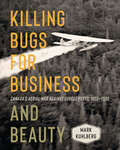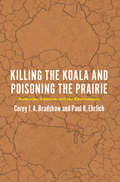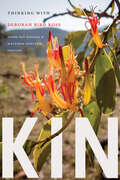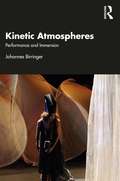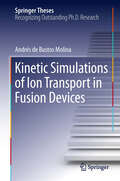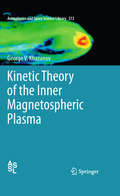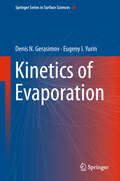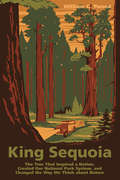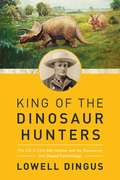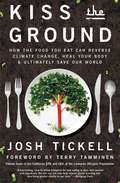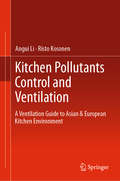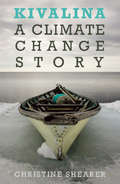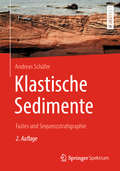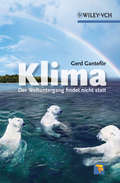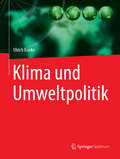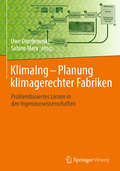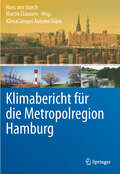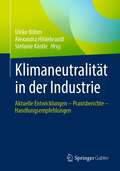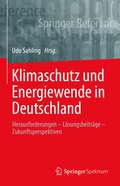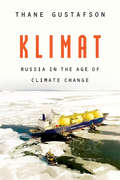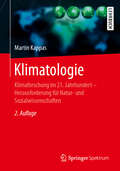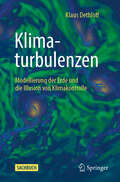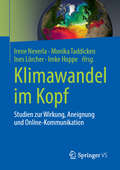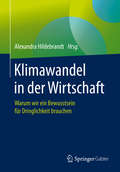- Table View
- List View
Killing Bugs for Business and Beauty: Canada’s Aerial War against Forest Pests, 1913–1930
by Mark KuhlbergKilling Bugs for Business and Beauty examines the beginning of Canada’s aerial war against forest insects and how a tiny handful of officials came to lead the world with a made-in-Canada solution to the problem. Shedding light on a largely forgotten chapter in Canadian environmental history, Mark Kuhlberg explores the theme of nature and its agency. The book highlights the shared impulses that often drove both the harvesters and the preservers of trees, and the acute dangers inherent in allowing emotional appeals instead of logic to drive environmental policy-making. It addresses both inter-governmental and intra-governmental relations, as well as pressure politics and lobbying. Including fascinating tales from Cape Breton Island, Muskoka, and Stanley Park, Killing Bugs for Business and Beauty clearly demonstrates how class, region, and commercial interest intersected to determine the location and timing of aerial bombings. At the core of this book about killing bugs is a story, infused with innovation and heroism, of the various conflicts that complicate how we worship wilderness.
Killing the Koala and Poisoning the Prairie: Australia, America, and the Environment
by Paul R. Ehrlich Corey J. A. BradshawThough separated by thousands of miles, the United States and Australia have much in common. Geographically both countries are expansive--the United States is the fourth largest in land mass and Australia the sixth--and both possess a vast amount of natural biodiversity. At the same time, both nations are on a crash course toward environmental destruction. Highly developed super consumers with enormous energy footprints and high rates of greenhouse-gas emissions, they are two of the biggest drivers of climate change per capita. As renowned ecologists Corey J. A. Bradshaw and Paul R. Ehrlich make clear in Killing the Koala and Poisoning the Prairie, both of these countries must confront the urgent question of how to stem this devastation and turn back from the brink. In this book, Bradshaw and Ehrlich provide a spirited exploration of the ways in which the United States and Australia can learn from their shared problems and combine their most successful solutions in order to find and develop new resources, lower energy consumption and waste, and grapple with the dynamic effects of climate change. Peppering the book with humor, irreverence, and extensive scientific knowledge, the authors examine how residents of both countries have irrevocably altered their natural environments, detailing the most pressing ecological issues of our time, including the continuing resource depletion caused by overpopulation. They then turn their discussion to the politics behind the failures of environmental policies in both nations and offer a blueprint for what must be dramatically changed to prevent worsening the environmental crisis. Although focused on two nations, Killing the Koala and Poisoning the Prairie clearly has global implications--the problems facing the United States and Australia are not theirs alone, and the solutions to come will benefit by being crafted in coalition. This book provides a vital opportunity to learn from both countries' leading environmental thinkers and to heed their call for a way forward together.
Killing the Koala and Poisoning the Prairie: Australia, America, and the Environment
by Paul R. Ehrlich Corey J. BradshawThough separated by thousands of miles, the United States and Australia have much in common. Geographically both countries are expansive—the United States is the fourth largest in land mass and Australia the sixth—and both possess a vast amount of natural biodiversity. At the same time, both nations are on a crash course toward environmental destruction. Highly developed super consumers with enormous energy footprints and high rates of greenhouse-gas emissions, they are two of the biggest drivers of climate change per capita. As renowned ecologists Corey J. A. Bradshaw and Paul R. Ehrlich make clear in Killing the Koala and Poisoning the Prairie, both of these countries must confront the urgent question of how to stem this devastation and turn back from the brink. In this book, Bradshaw and Ehrlich provide a spirited exploration of the ways in which the United States and Australia can learn from their shared problems and combine their most successful solutions in order to find and develop new resources, lower energy consumption and waste, and grapple with the dynamic effects of climate change. Peppering the book with humor, irreverence, and extensive scientific knowledge, the authors examine how residents of both countries have irrevocably altered their natural environments, detailing the most pressing ecological issues of our time, including the continuing resource depletion caused by overpopulation. They then turn their discussion to the politics behind the failures of environmental policies in both nations and offer a blueprint for what must be dramatically changed to prevent worsening the environmental crisis. Although focused on two nations, Killing the Koala and Poisoning the Prairie clearly has global implications—the problems facing the United States and Australia are not theirs alone, and the solutions to come will benefit by being crafted in coalition. This book provides a vital opportunity to learn from both countries’ leading environmental thinkers and to heed their call for a way forward together.
Kin: Thinking with Deborah Bird Rose
by Thom van Dooren and Matthew ChrulewThe contributors to Kin draw on the work of anthropologist Deborah Bird Rose (1946–2018), a foundational voice in environmental humanities, to examine the relationships of interdependence and obligation between human and nonhuman lives. Through a close engagement over many decades with the Aboriginal communities of Yarralin and Lingara in northern Australia, Rose’s work explored possibilities for entangled forms of social and environmental justice. She sought to bring the insights of her Indigenous teachers into dialogue with the humanities and the natural sciences to describe and passionately advocate for a world of kin grounded in a profound sense of the connectivities and relationships that hold us together. Kin’s contributors take up Rose’s conceptual frameworks, often pushing academic fields beyond their traditional objects and methods of study. Together, the essays do more than pay tribute to Rose’s scholarship; they extend her ideas and underscore her ongoing critical and ethical relevance for a world still enduring and resisting ecocide and genocide.Contributors. The Bawaka Collective, Matthew Chrulew, Colin Dayan, Linda Payi Ford, Donna Haraway, James Hatley, Owain Jones, Stephen Muecke, Kate Rigby, Catriona (Cate) Sandilands, Isabelle Stengers, Anna Tsing, Thom van Dooren, Kate Wright
Kinetic Atmospheres: Performance and Immersion
by Johannes BirringerThis book offers a sustained and deeply experiential pragmatic study of performance environments, here defined at unstable, emerging, and multisensational atmospheres, open to interactions and travels in augmented virtualities. Birringer’s writings challenge common assumptions about embodiment and the digital, exploring and refining artistic research into physical movement behavior, gesture, sensing perception, cognition, and trans-sensory hallucination. If landscapes are autobiographical, and atmospheres prompt us to enter blurred lines of a "forest knowledge," where light, shade, and darkness entangle us in foraging mediations of contaminated diversity, then such sensitization to elemental environments requires a focus on processual interaction. Provocative chapters probe various types of performance scenarios and immersive architectures of the real and the virtual. They break new ground in analyzing an extended choreographic – the building of hypersensorial scenographies that include a range of materialities as well as bodily and metabodily presences. Foregrounding his notion of kinetic atmospheres, the author intimates a technosomatic theory of dance, performance, and ritual processes, while engaging in a vivid cross-cultural dialogue with some of the leading digital and theatrical artists worldwide. This poetic meditation will be of great interest to students and scholars in theatre, performing arts as well as media arts practitioners, composers, programmers, and designers.
Kinetic Simulations of Ion Transport in Fusion Devices
by Andrés de Bustos MolinaThis thesis deals with the problem of ion confinement in thermonuclear fusion devices. It is a topic of general interest, as it helps to understand via numerical simulations the ion confinement properties in complex geometries, in order to predict their behavior and maximize the performance of future fusion reactors. The main work carried out in this thesis is the improvement and exploitation of an existing simulation code called ISDEP. This code solves the so-called ion collisional transport in arbitrary plasma geometry, improving in this sense other existing codes. Additionally, it presents outstanding portability and scalability in distributed computing architectures, such as Grid or Volunteer Computing. The main physical results can be divided into two blocks. First, the study of 3D ion transport in ITER is presented. ITER is the largest fusion reactor (under construction) and most of the simulations so far assume the axis-symmetry of the device. Unfortunately, this symmetry is only an approximation because of the discrete number of magnetic coils used. ISDEP has shown, using a simple model of the 3D magnetic field, how the ion confinement is affected by this symmetry breaking. Secondly, ISDEP has been applied successfully to the study of fast ion dynamics in fusion plasmas. The fast ions, with energies much larger than the thermal energy, are a product of the device's heating system. Thus, a numerical predictive tool can be used to improve the heating efficiency. ISDEP has been combined with the FAFNER2 code to study such ions in stellarator (TJ-II, LHD) and tokamak (ITER) geometries. It has also been validated by experimental results. In particular, comparisons with the CNPA diagnostic in the TJ-II stellarator are remarkable.
Kinetic Theory of the Inner Magnetospheric Plasma
by George V. KhazanovThe inner magnetosphere plasma is a very unique composition of different plasma particles and waves. It covers a huge energy plasma range with spatial and time variations of many orders of magnitude. In such a situation, the kinetic approach is the key element, and the starting point of the theoretical description of this plasma phenomena which requires a dedicated book to this particular area of research.
Kinetics of Evaporation (Springer Series in Surface Sciences #68)
by Denis N. Gerasimov Eugeny I. YurinThis monograph discusses the essential principles of the evaporationprocess by looking at it at the molecular and atomic level.In the first part methods of statistical physics, physical kinetics andnumerical modeling are outlined including the Maxwell’s distributionfunction, the Boltzmann kinetic equation, the Vlasov approach, and theCUDA technique.The distribution functions of evaporating particles are then defined.Experimental results on the evaporation coefficient and the temperaturejump on the evaporation surface are critically reviewed and compared tothe theory and numerical results presented in previous chapters.The book ends with a chapter devoted to evaporation in differentprocesses, such as boiling and cavitation.This monograph addressesgraduate students and researchers working on phase transitions andrelated fields.
King Sequoia: The Tree That Inspired a Nation, Created Our National Park System, and Changed the Way We Think about Nature (The\story Behind The Scenery Ser.)
by William C. TweedA naturist and historian for the National Parks Service offers a lively history of the giant sequoias of California and the love of nature they inspired. Former park ranger William C. Tweed takes readers on a tour of some of the world&’s largest and oldest trees in a narrative that travels deep into the Sierra Nevada mountains, across the American West, and all the way to New Zealand. Along the way, he explores the American public's evolving relationship with sequoias, also known simply and affectionately as Big Trees. It&’s no surprise that the sequoia groves of Yosemite and Calaveras were early tourist destinations. The species was the embodiment of California's superlative appeal. These giant redwoods were so beloved that special protections efforts sprang up to protect them from logging interests—and so began the notion of National Parks. Later, as science evolved to consider landscapes more holistically, sequoias once again played a major role in shaping this new perspective. Featuring a fascinating cast of adventurers, researchers, politicians, and environmentalists, King Sequoia reveals how one tree species transformed Americans' connection to the natural world.
King of the Dinosaur Hunters: The Life Of John Bell Hatcher And The Discoveries That Shaped Paleontology
by Lowell Dingus<P><P>The story of the extraordinary adventures behind the man who has discovered some of the amazing wonders of natural history. <P><P> Every year millions of museum visitors marvel at the skeletons of dinosaurs and other prehistoric creatures discovered by John Bell Hatcher. The life of the “King of Collectors” is every bit as fascinating as the mighty bones and fossils he unearthed. <P><P> Hatcher helped discover and mount much of the Carnegie Museum's world famous, 150 million-year-old skeleton of Diplodocus, a slender-necked, long-tailed, plant-eater whose skeleton has captivated our collective imaginations for more than a century. But that wasn’t all Hatcher discovered. During a now legendary collecting campaign in Wyoming between 1889 and 1892, Hatcher discovered a 66 million-year-old horned dinosaur, Torosaurus, as well as the first scientifically significant set of skeletons from its evolutionary cousin, Triceratops. Refusing to restrict his talents to enormous dinosaurs, he also discovered the first significant sample of mammal teeth from our relatives that lived 66 million years ago. The teeth might have been minute, but this extraordinary discovery filled a key gap in humanity’s own evolutionary history. <P><P> Hatcher’s discoveries form the bases of some of the most beloved and well-known collections and institutions in the world—Yale, The Peabody Museum, Princeton University, the Carnegie Museum, and more. Nearly one hundred and twenty-five years after Hatcher’s monumental “hunts” ended, acclaimed paleontologist Lowell Dingus invites us to revisit Hatcher’s captivating expeditions and marvel at this real-life Indiana Jones and the vital role he played in our understanding of paleontology.
Kiss the Ground: How the Food You Eat Can Reverse Climate Change, Heal Your Body & Ultimately Save Our World
by Josh TickellFrom Josh Tickell, one of America&’s most celebrated documentary filmmakers, comes a &“fascinating, easy-to-follow blueprint for how eating in ways that nourish and regenerate the soil can not only help reverse global warming, but also bring greater vitality to our lives&” (Wolfgang Puck). &“A must read for anyone committed to healing our bodies and our Earth&” (Deepak Chopra), Kiss the Ground explains an incredible truth: by changing our diets to a soil-nourishing, regenerative agriculture diet, we can reverse global warming, harvest healthy, abundant food, and eliminate the poisonous substances that are harming our children, pets, bodies, and ultimately our planet. This &“richly visual&” (Kirkus Reviews) look at the impact of an underappreciated but essential resource—the very ground that feeds us—features fascinating and accessible interviews with celebrity chefs, ranchers, farmers, and top scientists. Kiss the Ground teaches you how to become an agent in humanity&’s single most important and time-sensitive mission: reverse climate change and effectively save the world—all through the choices you make in how and what to eat. Also a full-length documentary executive produced by Leonardo DiCaprio and narrated by Woody Harrelson, &“Kiss the Ground both informs and inspires&” (Marianne Williamson, #1 New York Times bestselling author).
Kitchen Pollutants Control and Ventilation: A Ventilation Guide to Asian & European Kitchen Environment
by Angui Li Risto KosonenThis book has been written by two experts in ventilation and indoor air quality with vast experience in the field of kitchen ventilation in both Asia and Europe. The authors share their extensive knowledge of the subject and present the results of their research programs as well those of other researchers. Discussing advanced theories of and design approaches for kitchen ventilation, it is a useful reference resource for a wide range of readers, including HVAC researchers, designers and architects.
Kivalina: A Climate Change Story
by Christine ShearerThe true story of an Alaska Native village destroyed by flooding and erosion caused by climate change—and how they fought for help.Warming Arctic temperatures have been making coastal areas of Alaska increasingly uninhabitable. In 2008, the small Alaska Native village of Kivalina filed a legal claim against some of the world’s largest fossil fuel companies for damaging their homeland and creating a false debate around climate change. Academic and former journalist Christine Shearer explores the history leading up to the lawsuit, its connections to disaster management and adaptation, and its relationship to past misinformation campaigns involving lead, asbestos, and tobacco. Kivalina’s struggle for safe relocation, the book argues, is part of our common struggle to acknowledge and address climate change before it is too late.2012 Rachel Carson Environment Book Award (Honorable Mention)Praise for Kivalina“Moving, infuriating, ominous . . . . Shearer provides an impressively concise and comprehensive history of the growth of corporate power in America; its influence on, entwinement with, and corruption of government; [and] corporate obfuscation of industrial hazards.” —Publisher’s Weekly“Best book of 2011: one of the most timely and important books to be published in 2011—and in the past decade.” —Jeff Biggers, The Huffington Post“In novelistic detail, Shearer recounts the science, politics, legal battles, and human experience at one of the leading edges of climate change impact. In doing so, she . . . tells the story not just of one village in Alaska, but of us all.” —The Society of Environmental Journalists
Klastische Sedimente: Fazies und Sequenzstratigraphie
by Andreas SchäferKlastische Sedimente entstehen durch Verwitterung und Erosion von Gesteinen. In Faziesmodellen geordnet, dokumentieren sie die verschiedenen genetischen Bedingungen ihres Transports und ihrer Ablagerung. Diese werden hier anhand eigener Fallstudien und solcher aus der Literatur dargestellt und erklärt. Mit dem Arbeitskonzept der Sequenzstratigraphie werden Ablagerungsprozesse im Detail interpretiert, zeitlich fixiert und über große Entfernungen hinweg miteinander korreliert. Sie bereitet das ordnende Prinzip für die Analyse von Strukturen und Fazieskörpern in Sedimentbecken, und stellt ein hervorragendes Werkzeug für wissenschaftliche und vor allem angewandte Fragestellungen dar.Die zweite Auflage wurde aktualisiert, auf das gewachsene Arbeitsfeld der Sedimentgeologie angepasst und um regionale Beispiele ergänzt. Das moderne Layout wird durch die nunmehr farbigen Abbildungen unterstrichen. Wichtige Fachbegriffe werden sichtbar hervorgehoben.
Klima
by Gerd GanteförPanikmache oder sicheres Weltende? Was vom "Klimawandel" wirklich zu halten istKaum ein Thema erregt die Gemüter so wie die Frage, ob der Klimawandel uns alle ins Verderben stürzt oder wir nur einer Angst fördernden Kampagne hysterischer Umweltaktivisten aufsitzen. Die Diskussionen werden heiß geführt und münden oft in extreme Positionen und widersprüchliche Szenarien. Und eines ist bei alldem selten zu finden: verlässliche Orientierung. Genau diese bietet Gerd Ganteför mit seinem Buch.Orientierung durch WissenGerd Ganteför überprüft die gängigen Argumente, Mythen und Legenden: unabhängig, seriös und wissenschaftlich fundiert. So leistet er nicht nur eminent wichtige Aufklärungsarbeit, sondern fördert auch einige handfeste Überraschungen zu Tage. Der staunende Leser erfährt etwa, dass Flugreisende energieeffizienter unterwegs sind als Autofahrer, und er bekommt eine Vorstellung davon, was die Menschheit bei der nächsten Eiszeit erwartet. Ganz nebenbei vermittelt der Autor dabei fundiertes Wissen zu den zentralen Zukunftsthemen Klima und Energie.Provokation mit ArgumentenGanz bewusst tritt Gerd Ganteför der grassierenden "Lust am Untergang" entgegen. So verweist er auf die Vorteile der Klimaerwärmung, bindet Kohle- und Kernkraftwerke in eine Strategie zum Naturschutz ein und bescheinigt den Verfechtern regenerativer Energien, einem schönen Traum nachzuhängen. Selten sind solche Thesen mit so guten Argumenten vertreten worden wie in diesem Buch.
Klima und Umweltpolitik
by Ulrich RankeDer Klimawandel findet jetzt und überall statt ist. Das Buch legt die institutionellen Rahmenbedingungen dar, die notwendig sind, um im Kampf gegen den Klimawandel die Emissionen unter dem notwendigen Schwellwert von 2 °C zu halten. Ohne internationale Zusammenarbeit und grenzüberschreitende Initiativen wird dieses Ziel nicht zu erreichen sein. Eine Auswahl der bedeutendsten Klimaabkommen wird in diesem Buch in den naturwissenschaftlichen Kontext der Klimagenese gestellt und auf ihre sozioökonomischen und kulturellen Auswirkungen hin beleuchtet. Dazu werden zunächst die Themenfelder Klimawirkungen und die wissenschaftlichen Grundlagen des Klimageschehens beschrieben. Es werden die institutionellen und technischen Instrumente der Klimaschutzpolitik diskutiert und ausführlich ausgewählte Konferenzen unter dem Dach der Vereinten Nationen dokumentiert. Nach Paris 2015 lässt sich feststellen, dass der Klimawandel nur durch eine noch umfassendere Internationalisierung beeinflusst werden kann.
KlimaIng - Planung klimagerechter Fabriken: Problembasiertes Lernen In Den Ingenieurwissenschaften
by Uwe Dombrowski Sabine MarxDie mit dem Klimawandel verbundenen Risiken haben auch Konsequenzen für produzierende Unternehmen und ihre Produktionsstätten. Daher widmet sich das Buch der klimagerechten Planung von Fabriken und verknüpft dieses ingenieurwissenschaftliche Fachgebiet mit Grundlagenwissen zur Planung und Durchführung problembasierter Lehrveranstaltungen an Hochschulen. Im ersten Teil beschreiben die Autoren die Grundlagen des Klimawandels und der Fabrikplanung. Sie stellen zum einen die Vorgehensweisen zur Identifizierung von Klimarisiken und zum anderen Planungsansätze zu deren Reduzierung vor. Der zweite Teil verknüpft diese ingenieurwissenschaftlichen Aufgabenstellungen mit dem Konzept problembasierten Lernens. Dabei wird problembasiertes Lernen als Lehrmethode zum Erwerb und zur Anwendung praxisrelevanten Fachwissens verstanden, die stets die Lernenden in den Mittelpunkt stellt. Neben theoretischen Grundlagen und aktuellen Forschungsergebnissen zur Wirksamkeit problembasierten Lernens erhalten Leser hier auch Hinweise für die Implementation in der Praxis. Am Beispiel einer problembasierten Lehrveranstaltung, die im Rahmen eines Forschungsprojektes entwickelt wurde, wird eine didaktische Konzeption zur Planung und Durchführung problembasierter Lernumgebungen vorgestellt. Diese Modell-Lehrveranstaltung ist so aufbereitet, dass das Konzept ohne viel Aufwand auf andere Themengebiete der Ingenieurwissenschaften übertragen werden kann. Der dritte Teil des Buchs bietet eine Fallsammlung zu unterschiedlichen Lernzielen. Diese dienen Nutzern als Vorlage, um selbst geeignete Fälle für problembasierte Lernumgebungen zu konstruieren. Das Buch richtet sich an Lehrkräfte in ingenieurwissenschaftlichen Studiengängen, insbesondere solche mit dem Schwerpunkt Klimawandel und Fabrikplanung.
Klimabericht für die Metropolregion Hamburg
by Hans Von Storch Martin ClaussenDer Sachstandsbericht liefert einen Überblick über das wissenschaftlich gesicherte Wissen zu Klima, Klimavariabilität und Klimawandel in der Region Hamburg. Dabei beschreiben die Autoren sowohl das Wissen über die letzten 100 Jahre als auch über mögliche Veränderungen in den kommenden 100 Jahren. Es wird dargestellt, auf welchen Feldern Übereinstimmung besteht, wo Uneinigkeit oder Unwissen herrschen und wo Forschungsbedarf besteht. Der Bericht wurde im Rahmen des Exzellenzclusters CliSAP am KlimaCampus der Universität Hamburg erarbeitet.
Klimaneutralität in der Industrie: Aktuelle Entwicklungen – Praxisberichte – Handlungsempfehlungen
by Alexandra Hildebrandt Ulrike Böhm Stefanie KästleNachhaltigkeit und der Umbau der Wirtschaft zur Klimaneutralität sind große historische Kraftanstrengungen und Umwälzungen. Vieles läuft dabei parallel: die Bewältigung von Krisen, Effizienz und Innovationen sowie Technologieschübe. Zur Erreichung der Klimaneutralität braucht es vor allem einen ganzheitlichen Strukturwandel der Industrie. Dieses Buch unterstützt Unternehmen, ihren eigenen Weg zu planen und mit passenden Strategien und Maßnahmen zu unterlegen, denn mit den Klimaneutralitätszielen bis 2045 sind sie zum Handeln aufgefordert. Es versteht sich als Transfer- und Praxisbuch zum Thema Klimaneutralität in der Industrie mit dem Ziel, anwendbare und praxiserprobte Handlungsmöglichkeiten aufzuzeigen. Präsentiert werden Empfehlungen und ein Instrumentenmix, der Klimaschutz entlang der gesamten industriellen Wertschöpfungskette forciert. Gezeigt werden auch Risiken, die sich aus dem Klimawandel für Produktion, Betriebsabläufe und Lieferketten ergeben sowie mögliche Chancen, die sich durch die Veränderung der Rahmenbedingungen bieten.Das Buch verbindet außerdem unternehmensspezifische Ansätze mit politischen und gesellschaftlichen Debatten über Klimaneutralität, stellt die wichtigen Initiativen zur Klimaneutralität vor und widmet sich der Frage, wie sich Unternehmen durch Transparenz, Glaubwürdigkeit und Kommunikation der eigenen Klimastrategie aktiv im Markt positionieren. Das Werk richtet sich an Unternehmer*innen, CSR- und Nachhaltigkeitsbeauftragte, Fach- und Führungskräfte in Umwelt- und Nachhaltigkeitsverbänden und -organisationen sowie Industrie- und Unternehmensverbände. Es eignet sich auch für Studierende und Dozierende im Bereich Management.
Klimaschutz und Energiewende in Deutschland: Herausforderungen – Lösungsbeiträge – Zukunftsperspektiven
by Udo SahlingWie kann man Klimaschutz vor Ort erfolgreich umsetzen?Nach mehr als 20 Jahren Klimaschutzpolitik ziehen Autor*innen in diesem Handbuch Bilanz, wie Klimaschutz auch unter ungünstigen Rahmenbedingungen umgesetzt werden kann. Die vielseitige Zusammenstellung der Beiträge soll Leser*innen helfen, die ökonomischen und technologischen und vor allem gesellschaftspolitischen Veränderungen dieser Zeit zu erkennen und daraus Lehren für die Zukunft von Klimaschutz und Energiewende zu ziehen.Klimaschutz erfährt zurzeit durch die „Fridays for Future“-Bewegung große Popularität. Die nachfolgende Generation will wissen, was anders gemacht werden muss, damit es künftig besser laufen kann. Gerade wird uns zudem brutal vor Augen geführt, was die hohe Importabhängigkeit von fossilen Energieträgern bedeutet und dass es nur einen Erneuerbaren Weg gibt. Das Werk greift diese Aspekte auf und soll Mut machen, sich an einer emissionsfreien Zukunftsgestaltung zu beteiligen.
Klimat: Russia in the Age of Climate Change
by Thane GustafsonA discerning analysis of the future effects of climate change on Russia, the major power most dependent on the fossil fuel economy. Russia will be one of the countries most affected by climate change. No major power is more economically dependent on the export of hydrocarbons; at the same time, two-thirds of Russia’s territory lies in the arctic north, where melting permafrost is already imposing growing damage. Climate change also brings drought and floods to Russia’s south, threatening the country’s agricultural exports. Thane Gustafson predicts that, over the next thirty years, climate change will leave a dramatic imprint on Russia. The decline of fossil fuel use is already underway, and restrictions on hydrocarbons will only tighten, cutting fuel prices and slashing Russia’s export revenues. Yet Russia has no substitutes for oil and gas revenues. The country is unprepared for the worldwide transition to renewable energy, as Russian leaders continue to invest the national wealth in oil and gas while dismissing the promise of post-carbon technologies. Nor has the state made efforts to offset the direct damage that climate change will do inside the country. Optimists point to new opportunities—higher temperatures could increase agricultural yields, the melting of arctic ice may open year-round shipping lanes in the far north, and Russia could become a global nuclear-energy supplier. But the eventual post-Putin generation of Russian leaders will nonetheless face enormous handicaps, as their country finds itself weaker than at any time in the preceding century. Lucid and thought-provoking, Klimat shows how climate change is poised to alter the global order, potentially toppling even great powers from their perches.
Klimatologie: Klimaforschung im 21. Jahrhundert - Herausforderung für Natur- und Sozialwissenschaften
by Martin KappasKlimaforschung – Einführung in eine „Mega-Science"Die zweite Auflage des Lehrbuchs zur Einführung in die Klimatologie greift die Entwicklung als globale "Erd-Systemwissenschaft" auf. Sie ist hoch interdisziplinär, extrem problemgetrieben und zunehmend in internationale Zusammenhänge eingebettet. Naturwissenschaftliche Untersuchungen verbinden sich hier mit gesellschaftswissenschaftlichen Fragestellungen und Grundlagenforschung mit politischen Rahmensetzungen.Das Werk besteht aus drei miteinander vernetzten Teilen:I: Klimatologie als WissenschaftII: Klimawandel und Global ChangeIII: Wechselwirkungen: Klima – Mensch, Gesellschaft und PolitikDieses Buch liefert neue Einsichten zu Zusammenhängen im Bereich Erdsystemforschung und stellt das Konzept des „Anthropozäns“ vor, welches die Anerkennung einer radikal veränderten Mensch-Umwelt-Beziehung in den Vordergrund gerückt hat. Der Fokus der Neuauflage liegt auf den Verbindungen zwischen verschiedenen sozialen und ökologischen Prozessen und greift dabei auf die aktuellen Reports des IPCC zurück. Es ermöglicht Lesern Wissen über die ökologischen und menschlichen Aspekte des globalen Wandels aufzubauen und Lösungen für eine nachhaltige Entwicklung zu finden.Anders als bisherige Lehrbücher der Klimatologie geht das Werk sehr ausführlich auf das hoch aktuelle Themenfeld "Global Change" ein und verdeutlicht die gesellschaftliche Relevanz der Klimaforschung. Zahlreiche Abbildungen zeigen komplexe Klimaphänomene, aber auch internationale Forschungsnetzwerke und politische Strukturen auf.Dieses Buch sticht durch seinen interdisziplinären Ansatz hervor und wird insbesondere Forscher ansprechen, die sich für Themen im Bereich Globaler Umweltwandel interessieren. Es eröffnet neue Perspektiven auf die Zusammenhänge von Klima, Ozean, Waldbedeckung und Landnutzung sowie die Veränderung dieser Bereiche im Erdsystem. Leser gewinnen einen Überblick über die komplexen Forschungsstrukturen (Future Earth) und das Weltklimaprogramm.
Klimaturbulenzen: Modellierung der Erde und die Illusion von Klimakontrolle
by Klaus DethloffDer Klimawandel wird durch anthropogene Emissionen von Treibhausgasen aber auch komplexe natürliche Prozesse beeinflusst, die sich menschlicher Kontrolle weitestgehend entziehen. Die Berichte des IPCC erzeugen einen wissenschaftlich und politisch ausgehandelten Konsens, in dessen Folge die regierenden Eliten suggerieren, durch eine CO2 Steuer das Klima kontrollieren zu können. Diese und andere Maßnahmen basieren jedoch oft auf unsicheren Annahmen der Klimaforschung. Klimaprojektionen der Zukunft beruhen auf Modellen, deren Fehler zu groß sind und die interne Klimavariabilität unterschätzen. In mittleren Breiten können interne Klimatrends anthropogene Einflüsse sogar übertreffen. Wichtige Prozesse wie die geothermische Erwärmung der Ozeane werden zudem in allen Modellen vernachlässigt. Daher muss sich die menschliche Zivilisation auf unvorhersehbare Überraschungen vorbereiten, da interne Variabilität zu erheblicher Unsicherheit in den Klimaprojektionen führt und die Kontrolle des Klimawandels verhindert. Klimaänderungen haben komplexe ökonomische, ökologische, geopolitische sowie soziale Auswirkungen. [SS3] Die durch Medien und Politik dominierte Meinungsmaschinerie ignoriert die Unsicherheiten der Klimaprojektionen und benutzt diese für regionale Anpassungsmaßnahmen. In den wohlhabenden G7 Ländern und der EU wird eine unrealistisch schnelle Umstellung von fossilen Energieträgern auf erneuerbare Energien angestrebt. Die Diskussion um eine Dekarbonisierung der Industrie innerhalb von Jahrzehnten ist kontrovers, da eine Versorgungssicherheit mit regenerativen Energien in diesen Zeiträumen nicht erreichbar ist. Angesichts geopolitischer Spannungen steigt das Risiko eines Atomkriegs wieder an, was die Diskussionen um verstärkten Klimaschutz und militärische Aufrüstung widersprüchlich erscheinen lässt. Das Damoklesschwert einer gefahrenreichen Klimazukunft zwingt uns, politische und soziale Kurskorrekturen vorzunehmen und glaubwürdige Strategien zur nachhaltigen Nutzung unserer begrenzten Ressourcen zu entwickeln. Dieses Buch lädt Sie ein, die komplexen Zusammenhänge und die oft verschwiegenen Unsicherheiten der Klimaforschung zu erkunden. Über die Klimawissenschaften führt es zu einer tieferen Erkenntnis über unsere wirkliche Rolle in den globalen Klimaturbulenzen.
Klimawandel im Kopf: Studien zur Wirkung, Aneignung und Online-Kommunikation
by Monika Taddicken Irene Neverla Ines Lörcher Imke HoppeKlimawandel ist ein Meta-Thema - seit Jahrzehnten auf der Agenda der Medien, global diskutiert, mit vielen Anschlusspunkten in politische, wirtschaftliche, kulturelle Fragen und Alltagsbelange. Was aber findet sich in den Köpfen der Menschen zum Thema Klimawandel? Welche Kommunikationskanäle, welche journalistischen und welche Online-Angebote waren dafür wichtig, und wie hängen Wissen, Einstellungen und Verhaltensbereitschaften damit zusammen? Die mit verschiedenen Methoden erarbeiteten Ergebnisse in diesem Buch zeigen, wie ,eigensinnig' bzw. kreativ sich Menschen das Thema Klimawandel aneignen, wie vielfach vernetzt und ,rhizomartig' die klimabezogene Kommunikation verläuft.
Klimawandel in der Wirtschaft: Warum wir ein Bewusstsein für Dringlichkeit brauchen
by Alexandra HildebrandtErfahren Sie, was Unternehmen und Privatpersonen aktiv für den Klimaschutz tun könnenDas Buch widmet sich der Frage, warum wir ein Bewusstsein für Dringlichkeit brauchen und plädiert für einen bewussteren Umgang mit unserer Zukunft. Es sollen keine weiteren Ängste geschürt werden, sondern verdeutlicht werden, dass die Krise eine enorme Chance ist, weil sie dazu führt, das Leben wieder bewusster wahrzunehmen und zu erkennen, dass ein „Weiter so“ nicht möglich ist. Folgende Themenschwerpunkte stehen im Fokus der Beiträge: Der Klimawandel: Einfluss auf Wirtschaft und GesellschaftKlimawandel der GenerationenUnternehmerische Nachhaltigkeit - aus der Praxis für die PraxisÖkonomie und Nachhaltigkeit - Management und NachhaltigkeitsberichterstattungWissen als Basis für VeränderungenEs wird gezeigt, warum uns nur eine ganzheitliche Verbindung hilft, Antworten auf die großen existenziellen Fragen zu finden, die sich angesichts globaler Bedrohungen auftun. Die Beiträge wurden durch die Fridays-for-Future-Bewegung beeinflusst, die belegt, wie wichtig es ist, dass sich nicht nur Wirtschaft, Wissenschaften und Kultur ergänzen, sondern auch alle Generationen wertschätzend miteinander kooperieren.Das Buch richtet sich an Manager und Führungskräfte, Wissenschaftler und Journalisten, Wirtschafts- und Umweltverbände sowie die Fridays-for-Future-Bewegung und zeigt neue, praxisorientierte Perspektiven auf die Herausforderung des Umweltschutzes auf.Dieses Buch zeigt auf, wie jeder Einzelne zum Umweltschutz beitragen kann, indem er bewusste und klimafreundliche Entscheidungen trifft.stellt umfassende Maßnahmen und Programme für Unternehmen vor, die sie beim Klimaschutz unterstützen.schlägt die Brücke zwischen Theorie und Praxis, indem gezeigt wird, wie Absichten und Denkweisen in konkrete Handlungen umgesetzt werden können.weist nach, dass Nachhaltigkeit nichts Gestriges ist, sondern etwas Dringliches, bei dem es auch um vernetzte Ansätze, um fähige Könner und Meister, Praktiker, Wissenschaftler, Ingenieure, Techniker und Kreative geht, die gemeinschaftlich Lösungen für die Herausforderungen der Gegenwart finden.Anhand von Generationenkonzepten, konkreten Handlungsmaßnahmen, zahlreichen Erfahrungsberichten und Praxisbeispielen wird dargestellt, dass die verschiedenen Generationen aufeinander angewiesen sind und gesellschaftliche Probleme nur gemeinsam gelöst werden können.
